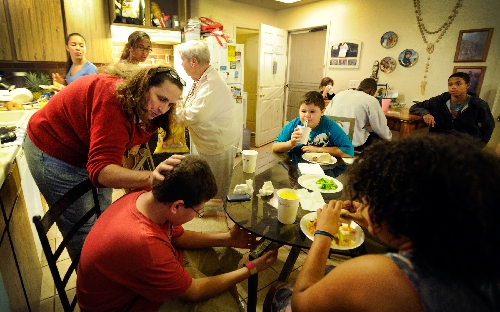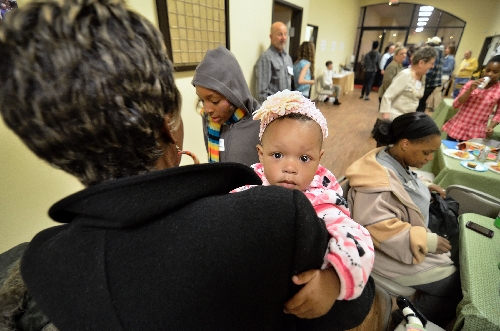Grandparents open their homes, hearts to children
Getting seven children ready for school each morning is no easy task. That's seven showers (only some of which are sure to be hot), seven breakfasts and seven outfits to be prepared before each one leaves for school.
Eileen Dies and her daughter Genette have had temporary custody of four of Eileen's grandchildren since May. Following abandonment by their mother in Arizona and several days in Child Protective Services, the Dieses brought them to Las Vegas. At the end of the month, their temporary guardianship expires. If a problem arises at school, the two will not have the right to make medical or education decisions without permanent guardianship.
Colette Pagel, Eileen's other daughter, moved into her mother's house last month with three of her children.
In comparison to their guardianship struggles, the Dieses said sharing their 1,100-square-foot home with seven kids is a nonissue.
Since May, they have battled a disjointed system and struggled to receive the financial, medical and legal support they need to properly care for the children. Eileen, Genette and Colette are all on disability.
LOOKING FOR HELP
They are only one family among 19,000 in Clark County with a grandparent in the care of a younger relative, according to the 2010 U.S. Census. The children are among 35,451 in the county living in a grandparent-headed home, which means the majority of grandparents, often surviving on Social Security as their only income, take in more than one relative.
Genette said there are often too few services and even fewer answers when it comes to getting support.
But the family has managed.
When the family expanded, the Dieses tried to make their home more comfortable for the kids. They purchased more beds, bought new clothes, renovated their garage into a fifth bedroom and began cutting back on finances any way they could.
"You don't go out to eat, and you don't buy expensive frozen dinners," Genette said. "You don't need those things to be a family. You have to know where to save. Right now I'm only taking half the doses of my medications. My doctor would probably kill me; but if I don't cut that, then I have to cut from the kids somewhere."
Despite sacrifices, there are some issues the Dieses cannot tackle without proper guidance and legal support.
The courts define physical and legal custody very differently. Rights concerning education, medical, legal or financial decisions are defined as legal custody - usually reserved for a parent. Most forms of financial support, and services such as food stamps, require legal custody, which many families headed by a grandparent or other relative struggle to attain.
"Without permanent guardianship, their biological mother can come back and take them," Genette said. "(The children have) threatened to run away if their mother comes back - and they will.
"Children don't need to be with strangers, not when they can be with family. But those families need support."
LEGAL GUARDIANSHIP
Deana Sanchez, the grandmother and caregiver of her 10 grandchildren, has faced similar struggles when dealing with the legal system.
After Sanchez gained physical custody of her 10 grandchildren on Sept. 12, she found it difficult to find the financial support she needed. Matters became worse exactly a month later, when her home was flooded - a total loss.
Sanchez and the kids spent three days in Red Cross housing and a few days with the children's biological mother, before a friend loaned her money to purchase a five-bedroom home.
Although Sanchez has received support from other family members and friends, she says more official help is needed - especially concerning permanent legal guardianship and finances.
When Sanchez was referred to Foster Kinship, a program to help adults in the care of their relatives, she considered it a blessing.
Foster Kinship is a nonprofit organization that helps foster families connect with the legal and financial resources necessary to take care of their young relatives. The organization offers free support groups, classes, family activities and individual counseling to help adults take care of children who may or may not be in their legal care.
"There are a lot of systems to navigate - legal, medical, educational and family services," Ali O'Donnell, director and founder of the program, said. "If there's a crisis, we'll do whatever we can, but our ultimate goal is to show people what resources are available. A lot of the people I talk to never needed assistance in the past. So we're trying to step in and fill in that gap."
The program also offers immediate crisis management for families who can't wait for lengthy government procedures.
After Sanchez was denied extra financial assistance for the 10 children, because she doesn't have legal custody, O'Donnell showed up on Sanchez's doorstep with gift certificates for food.
FOSTER KINSHIP
Genette Dies agreed that Foster Kinship has made the legal process a manageable one.
"Ali makes it easy," she said. "She's always back to me within 24 hours. (With Foster Kinship) you're not dealing with a government bureaucracy; you're dealing with people who give a darn."
But O'Donnell and the families said figuring out where to go for custody was a difficult first step.
The Rev. Dan Gerome, assistant minister at the Center for Spiritual Living, said he and his congregation decided to reach out to kinship families after a meditation group. They struggled to find an organization for almost six months, however, because most resource groups were out of business or nearly impossible to reach by phone.
"We looked in the phonebook and on the Internet for months," Gerome said. "It was very challenging to connect with an agency that does this kind of work. For the people actually trying to find help, the system isn't that cohesive. If it was hard for us, the people who want to give, imagine how hard it is for the ones with 10 kids looking for the help."
According to the Foster Kinship website, 69 percent of children in foster care in Clark County are in the care of a grandparent, while 31 percent are raised by an aunt, uncle or other relative. Twenty percent of those children living in relative-headed households are living in poverty.
Genette is finally receiving the guidance she needs to navigate the path to permanent legal guardianship, but she said more needs to be done to help the thousands in need.
"I wish they would make it easier for the kids. We shouldn't have to jump through all these hoops. (The children) feel the stress too. They shouldn't make it harder for these families who have already gone through so much."
Contact reporter Tara Verderosa at tverderosa@reviewjournal.com or 702-383-0264.































